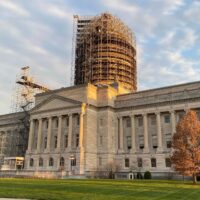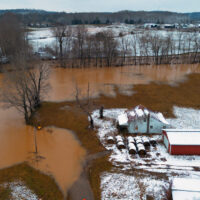The Kentucky Open Government Coalition, a nonpartisan organization that promotes an understanding of the state’s sunshine laws, posed five questions to the two candidates for Kentucky attorney general about the AG’s duties related to the state’s Open Meetings and Open Records Acts. Here are the responses from the Republican candidate, Daniel Cameron, and the Democratic candidate, Greg Stumbo.

(Hoptown Chronicle previously published Stumbo’s responses when he answered the survey in late August. Cameron sent his responses to the coalition on Oct. 16; and the responses from both candidates are being published here so voters can compare their answers.)
Questionnaire for Attorney General Candidates
How will you commit office resources to ensure that the Office of the Attorney General fulfills its statutory duties and meets statutory deadlines for issuing open meetings and open records decisions?
Stumbo: As I did during my prior term, I will staff the office or personnel responsible for meeting the statutory requirements for Open Records Act responses by the OAG. Prompt response to constituent requests will be an emphasis for my office.
Cameron: I believe in open meetings and records and recognize the important role that the Office of the Attorney General plays in ensuring transparency among public officials. I would place a priority on meeting the statutory deadlines for these decisions and allocate the resources as necessary and as they are available to ensure compliance.
Do you believe that the attorney general should follow precedent established by the office and the courts in interpreting and applying the open meetings and open records laws?
Stumbo: Legal precedent is important to lawyers in many facets of their job. As Attorney General I will ensure that staff addressing or reviewing open records and open meetings issues are aware of precedent and make diligent search of updates to law or understanding across Kentucky and in sister states.
Cameron: I believe that the role of the Attorney General is to enforce the laws that are passed by the General Assembly, signed into law by the Governor, and interpreted by the courts. I will of course review those precedents after being elected Attorney General, but that review would be colored by my belief that public records and open meetings laws are important to holding public officials accountable.
The attorney general intervened in three cases in 2016 to defend the authority of the Attorney General’s Office under KRS 61.880(2)(c) to request copies of disputed records for in camera inspection in open records appeals. Two of those cases, Kentucky Kernel v. University of Kentucky and Western Kentucky University v. Kentucky Kernel, are unlikely to be resolved by the end of 2019. Will you pursue both of these cases to defend the authority of the Attorney General’s Office under KRS 61.880(2)(c). Please explain your reasons for pursuing, or not pursuing, these cases.
Stumbo: My office and staff will review those cases and act to fully defend the Attorney General’s authority to request and inspect records under the Open Records Act parameters. I believe that the Attorney General should continue to have oversight over open communications and transparent government.
Cameron: I take seriously the responsibility of the office to enforce and defend the laws passed by the General Assembly and the Constitution of the Commonwealth of Kentucky. As with any pending litigation, I will reserve final judgement until I have had the opportunity to diligently review it, along with all supporting information once I am elected Attorney General. However, I generally support open records and meetings laws and will advocate to protect the authority of the Attorney General’s Office.
What resources, if any, will you commit to improving open meetings and records compliance by public officials and increasing public awareness of Kentucky’s open government laws?
Stumbo: Educating the public about their rights as outlined under Kentucky law will be important to my office. Citizens should know how the law protects them and each division in the Office of Attorney General should be responsible for educational outreach to organizations, local and city governments and the members of the public they serve. The Office of Attorney General must invest time in providing Kentuckians with the information they need to have the laws best serve them.
Cameron: I believe that compliance with open meetings and records laws are critical to holding our public officials accountable and maintaining a functioning democracy. If elected, our office will engage and act as a resource for public officials to ensure they understand the standards that the law requires them to meet. We will also ensure that the public has access to these standards, so they have the information needed to hold their elected officials accountable. Under my leadership, we will enforce the law, and any those who flaunt open meeting and records requirements to betray the public trust will be held accountable.
If legislation is proposed that reduces the public’s existing rights under the open meetings and records law, should the attorney general advocate to preserve the laws?
Stumbo: Bills and proposed laws that affect the rights of the public to understand and be involved in their government. All such bills should be reviewed by the Office of Attorney General. Within the parameters set by the Kentucky Constitution, my office will work with the legislature and the public to protect open government and transparency.
Cameron: I will be an advocate for transparency and integrity among public offices and would express my support for open meetings and records to the legislature and the governor.
(Jennifer P. Brown, Hoptown Chronicle’s editor, also serves on the Kentucky Open Government Coalition board.)
Jennifer P. Brown is co-founder, publisher and editor of Hoptown Chronicle. You can reach her at editor@hoptownchronicle.org. Brown was a reporter and editor at the Kentucky New Era, where she worked for 30 years. She is a co-chair of the national advisory board to the Institute for Rural Journalism and Community Issues, governing board past president for the Kentucky Historical Society, and co-founder of the Kentucky Open Government Coalition. She serves on the Hopkinsville History Foundation's board.





